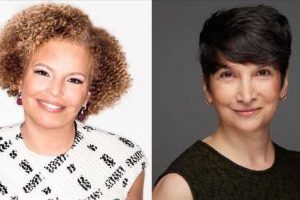Debra Lee, former BET Networks CEO, Launches New Search Firm To Boost Diversity On Corporate Boards

Debra Lee, former CEO of BET Networks, has launched Monarchs Collective, a consultancy to boost corporate board diversity as new rules and heightened social awareness make director appointments more of a key issue than ever before.
She and partner Rabia de Lande Long, an executive coach and management consultant to Fortune 500 companies, will work from both coasts to “build better boards and better companies” inside and out of the media and entertainment space, advising on directors and executive leadership and helping corporate America “discover, develop, and promote exceptional Black and women executives.”
Lee is both of those and has been sitting on boards for twenty years. She currently serves as a director at WarnerMedia parent AT&T, Burberry, Marriott and Procter & Gamble.
Related Story
Corporate Boards Will Get More Diverse In 2021 With Social Justice Jolt, New Regs, Covid Impact
Sitting on boards “was an important part of my career. I learned a lot. I enjoy the board work. The hard thing to face is that companies have been talking about diversifying their boards for a long time and claim they can’t find competitive board candidates and women of color, or don’t care,” Lee told Deadline.
“Then we had this tragedy of George Floyd and so much pressure was put on companies to support Black Lives Matter. But how they did it was write big checks to social justice, which is wonderful. Media companies created PSAs… But if you are so committed to racial equality, show us your board and your senior leadership team. And if you have an all-white board, how do you justify that?”
She and de Lande Long have deep networks of corporate contacts and, they say, plenty of people inquiring about how to get onto boards. They will play matchmaker. Companies that struggle to find diverse directors “are just fishing in the wrong pond or dealing with search firms that don’t have a pipeline to these executives,” Lee said. “I shouldn’t be getting as many calls as I am. I am getting close to retirement age. It’s not that difficult. People are out there.”
She recently helped connect one of her former executives at BET, Michael Armstrong — currently Executive VP, Worldwide Television Licensing & Operations at ViacomCBS Global Distribution Group — with Canada Goose. He was appointed to the board of the luxury apparel group last week.
“My first board was Kodak [then] Revlon … I went on Burberry. I found that [boards] helped me in my mission to be a better CEO, a well-rounded executive.”
Boards also create wealth as directors usually receive stock in the company. “If you serve for a long time, you can accumulate a lot of stock. I am all about accumulating wealth in the Black community. It is not about a salary. It is about creating wealth,” she said.
And “You want to make sure they [diverse directors] get the chance to serve as chairs of committees,” she added.
Last month, Starbucks named Mellody Hobson non-executive chair of its board as of March. The co-CEO of asset management firm Ariel Investments (and wife of George Lucas) joined the Starbucks board in 2005 and was named vice chair in 2018.
Former FCC chairman William Kennard became chairman of the AT&T board earlier this month.
“The board has to be in the mix. If you have employees looking at the board and you don’t have any diverse people, it sends a message,” she said, noting that boards can prod companies in directions executive may not because they “have too much to lose.” Businesses with diverse boards and leadership teams perform better, said Lee, who was chairman and chief executive of BET for 13 years through 2018.
The duo’s timing is good. California now requires companies based there to add at least one woman and one diverse director, more depending on board size. A handful of other states have followed. The Nasdaq Stock Exchange wants to require its circa 2,700 listed companies to publicly disclose board composition and have a woman and a diverse director, or explain why they don’t. That proposal has to be approved by the SEC.
Wall Street has begun to step up. As of last summer, Goldman Sachs won’t IPO any company that does not have a diverse director. Investment firm State Street in August told the public companies in its large portfolio that starting this year it expects detailed communication about board and workforce diversity.
As Deadline has reported, MeToo, protests that erupted last spring over the police killing of George Floyd, the steady rise of ESG investing (Environmental, Social and Governance focused) and the business disruption caused by a global pandemic are pushing boards to shed the white, male golfing buddy ethos and go broader.
Lee and de Lande Long said Monarchs Collective offers an approach customized to “each company’s unique culture, corporate strategies, and business complexities to ensure that the organizations are prepared for the implications of greater diversity and that diverse talent is enabled to make a meaningful impact and flourish.”
Some companies “are just running out, trying to find a black person,” said Lee.
So, “I come in and say, ‘You say you want this to happen, but are you set up for this?’” said de Lande Long. She talks to companies about how “to shift the vibe” on a board or a leadership team, and she said she explores if candidate “will be additive to your culture. Wil they be a good fit?”
On the other side, they’ve developed a primer that takes would-be directors through the paces in a five-part program that includes “board vocabulary” and mock board meetings.
“There’s much more of a genuine commitment than there ever has been,” said Lee. “I am optimistic.”
Read More About:
Source: Read Full Article
